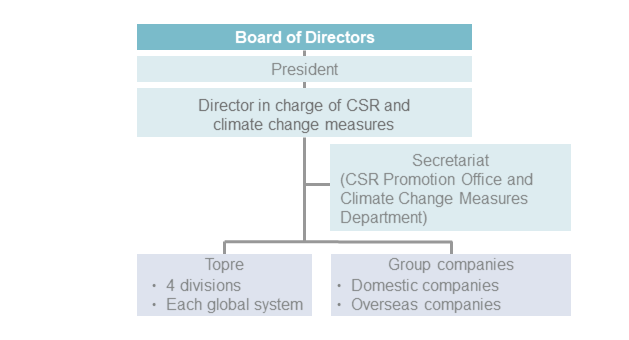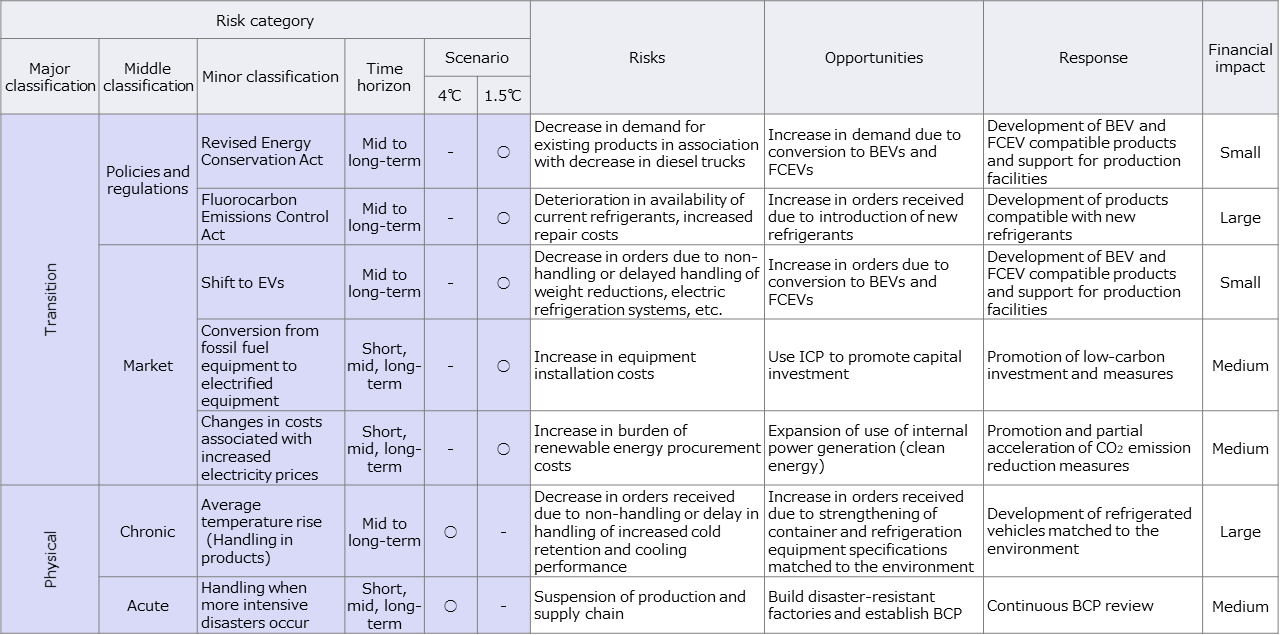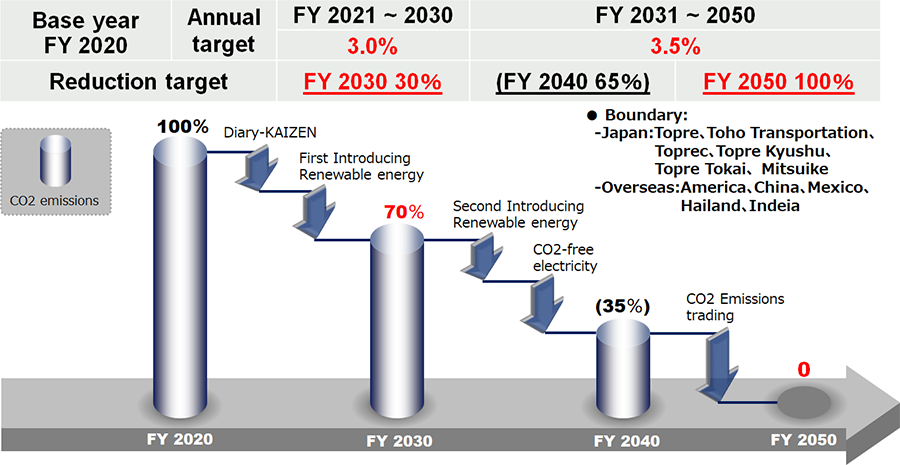The group recognizes that climate change problems are an important issue in the environmental area of corporate sustainability. The group raised a CO₂ emissions reductions target in March 2022 and is advancing initiatives systematically towards its achievement.
Disclosure based on TCFD recommendations
Environmental initiatives
Response to TCFD recommendations

In addition, the group has expressed its support for TCFD as an indication of its positive response to climate change. We will analyze scenarios of the risks and opportunities presented by climate change, and promote the disclosure of climaterelated information in line with the TCFD framework. Following on from the group’s main business, press-related products business, we have set risks and opportunities in the group’s other major business, temperature controlled logistics-related business, from fiscal year 2024.
Governance
The Topre Group has built a framework for action on climate change headed by the Board of Directors. The Board of Directors is composed of all Directors, including External Directors, with the President assuming the role of chair. The secretariat reports to the Board of Directors under the direction of the Director in charge of CSR and climate change measures.
Topre uses similar frameworks for action on climate change and CSR initiatives, and the results of Topre Group CSR Meetings, including the details of action on climate change, which are held regularly twice a year, are reported to the Board of Directors. In addition, the Board of Directors conducts reviews through the Director in charge of CSR and climate change measures when important issues related to action on climate change occur.

*1: Automotive Equipment, Refrigeration Equipment, Air Conditioning Equipment, Electronic Equipment
*2: Topre global systems: Internal Control Committee; Operations, Purchasing and Quality Headquarters;
ISO 14001 (Environment) Secretariat; Safety and Health Committee
*3: Domestic companies: Toho Transportation, Toprec, Topre Kyushu, Topre Tokai, Mitsuike
*4: Overseas companies: USA, China (4 companies), Thailand, Mexico, India
Strategy
The group analyzed two scenarios in regard to the impact of climate change on the company’s press-related products business and temperature controlled logistics-related business, one with a global average temperature rise of 4 degrees Celsius and one with a global average temperature rise of 1.5 degrees Celsius, and identified the “transition” and “physical” risks and opportunities in consideration of the size of their impacts. The tables are disclosed separately as there is a difference in business structure between press-related products business and temperature controlled logistics-related business. The group will promote its response so that we can minimize the risks and create opportunities.
In press-related products business, in addition to the further development of hot stamp processing technologies, we are continuously developing technologies such as cold ultra high tensile plates processing technology, which will be effective in the reduction of CO₂ emissions by reducing fuel and weight during production, as an alternative technology to hot stamp processing. We are working to contribute to the future reduction of CO₂ emissions.
In temperature controlled logistics-related business, we are developing highly efficient, lightweight products and their production facilities in anticipation of the conversion of refrigerated trucks to BEVs and FCEVs, continuing to develop products compatible with new refrigerants in relation to the Fluorocarbon Emissions Control Act, and working to contribute to future CO₂ emission reductions.
Assumed scenarios
1.5℃ scenario
This scenario is based on the premise of limiting the global temperature rise to 1.5℃. It assumes that sufficient use of energy without CO₂ emissions is achieved, and that the process is carried out in a circular manner.
〈Reference material〉
・IPCC (Intergovernmental Panel on Climate Change) SSP1-1.9
・IEA (International Energy Agency) NZE (Net-Zero Emissions by 2050 Scenario)
4℃ scenario
This is a scenario under which average temperatures will continue to rise as decarbonization policies are not strengthened, and natural disasters will become more frequent and more severe. It assumes that energy use without CO₂ emissions will not be implemented sufficiently.
〈Reference material〉
・IPCC (Intergovernmental Panel on Climate Change) SSP5-8.5
・IEA (International Energy Agency) STEPS (Stated Policies Scenario)
Major risks and opportunities
Financial impact: Large (10 billion yen or more), Medium (1 billion to less than 10 billion yen), Small (less than 1 billion yen)
Time horizon: Short (to 2026), Mid (to 2030), Long (to 2050)
[Press-related products business]
![[Press-related products business]](/en/sustainability/environ/TCFD/images/fig-index-02.png)
[Temperature controlled logistics-related business]

Risk management
The group analyzes in detail corporate risks, including sustainability risks, in each division. Reevaluation is carried out once a year in each division and the results are reported to the Risk Management Subcommittee. Risks judged to be of high importance are listed and managed by the Risk Management Subcommittee. New risks that are judged to require the formulation of new plans or existing risks that are judged to require a review are considered and dealt with in each division without restrictions on the timing of the reevaluation of risk. The results are reflected in the reevaluation of risk.
The Risk Management Subcommittee asks each base to implement BCP initiatives with regard to risks on the list concerning all bases as required to enhance the BCP. Even if climate-related risks are not related to all bases, the Risk Management Subcommittee requests BCP initiatives as required based on the regional and geographical conditions of each base, and plans to manage them in relation to the risk management at each base.
In addition, Climate Change Countermeasures Department is promoting the group’s reduction of CO₂ emissions, but a dedicated department in charge of the promotion of carbon neutrality activities has been established separately in the large Automotive Equipment Division. In line with the TCFD framework, climate-related risks are evaluated and reviewed once a year by the dedicated department and related parties who grasp the latest information on the automotive industry, and the results are reported to the Board of Directors.
Indicators and targets
Topre Group CO₂ emissions reduction targets
Base year : FY2020
CO₂ emissions : 71.6 (kt-CO₂) *1
*1 With the addition of Guangzhou Miike, a consolidated subsidiary, the CO₂ emissions for fiscal year 2020 have been revised from 68.8 (kt-CO₂) to 71.6 (kt-CO₂).
*2 In July 2025, we changed our CO₂ emissions target for fiscal 2030 from a 30% reduction to a 46% reduction.

The Topre Group has engaged in the full-fledged rollout of CO₂ emissions reduction measures (energy-saving measures, installation of solar panels, etc.) at each base in Japan since fiscal year 2022, and overseas since fiscal year 2023. These measures have gradually had a greater impact in terms of reducing CO₂ emissions, as a result of solar panels, since fiscal year 2023. In addition, some bases achieved carbon neutrality ahead of schedule in fiscal year 2024 by “switching to renewable energy-derived electricity” and “purchasing non-fossil certificates with tracking.”
The Topre Group will actively promote measures to achieve our CO₂ emissions reduction targets.
Click here for CO₂ emissions [Scope1,Scope2,Scope3]
Last updated:October 22, 2025 Update the content of the initiative
